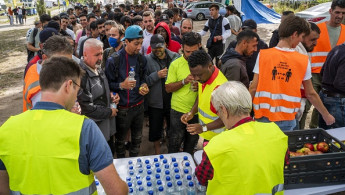Dutch capital to host 1,000 refugees on cruise ship
The Dutch capital Amsterdam on Tuesday said it would house at least 1,000 asylum seekers on a cruise liner after an overcrowding crisis at migrant centres left people sleeping outdoors.
The city council said the huge ship will be docked in Westelijk Havengebied industrial area, far from the canals and tourist attractions of the city, from October 1 for at least six months.
It could eventually house 1,500 people if needed.
The announcement comes days after aid agencies warned of a humanitarian crisis at the Ter Apel migrant centre in the northern Netherlands, where a three-month-old baby died last week.
"With the arrival of the cruise ship in Amsterdam, we are taking another step together in solving the crisis in the asylum chain," Dutch migration minister Eric van der Burg said.
Amsterdam city council said in a statement that plan, financed by the central government, would "help resolve the worrying humanitarian situation at Ter Apel".
"The situation at Ter Apel is heartbreaking," said Rutger Groot Wassink, the councillor responsible for social affairs and refugees, said in the statement.
"We now have to solve the shortage of reception locations together so that refugees find a place."
Amsterdam is the second Dutch city to host refugees on a cruise liner after the municipality of Velsen-Noord, since the government first said in July that it planned to house asylum seekers on ships.
Dutch rights groups described the cruise ship plans at the time as "absurd".
Dutch authorities at the weekend began to bus out asylum seekers from the Ter Apel centre, where more than 700 people had been sleeping rough outside the gates.
AFP correspondents on Friday saw hundreds of men on the ground under makeshift tarpaulins, close to a row of dirty portable toilets with no other facilities.
Dutch Prime Minister Mark Rutte said after the baby's death that there were "shameful scenes at the centre" and that mistakes had been made, but he promised a "structural solution" to the problem.
The crisis has been caused largely by staff shortages after the government scaled down capacity during the coronavirus pandemic.





 Follow the Middle East's top stories in English at The New Arab on Google News
Follow the Middle East's top stories in English at The New Arab on Google News
![Netanyahu furiously denounced the ICC [Getty]](/sites/default/files/styles/image_330x185/public/2024-11/GettyImages-2169352575.jpg?h=199d8c1f&itok=-vRiruf5)
![Both Hamas and the Palestinian Authority welcomed the ICC arrest warrants [Getty]](/sites/default/files/styles/image_330x185/public/2024-11/GettyImages-2178351173.jpg?h=199d8c1f&itok=TV858iVg)
